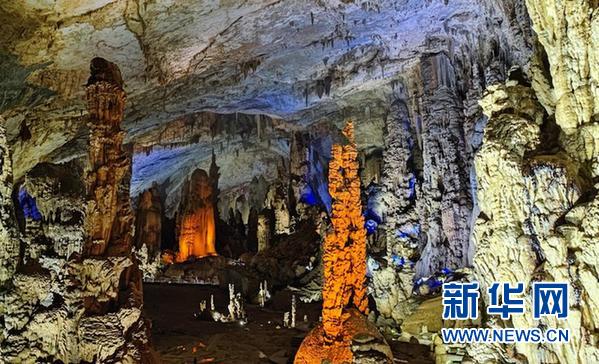
Opened to the public in 1985, Zhijin Cave in Guizhou's Bijie city has emerged as a famed scenic spot.[Photo/Xinhua]
A study tour poster, aimed at enticing students and igniting their curiosity for cave exploration, presents a series of thought-provoking questions: "Do you know how these amazing stalactites were formed? How old are they? What should we do to protect their beauty?"
In the mountains of southwestern China, widespread karst landforms have given rise to numerous natural caves, offering unique resources for tourism. In the mountains of Guizhou province alone, over 5,000 caves have been identified.
Opened to the public in 1985, Zhijin Cave in Guizhou's Bijie city has emerged as a famed scenic spot. This summer, it has attracted numerous sightseeing tourists and curious students alike, forming large crowds of enthusiastic visitors.
Two weeks ago, more than 100 students and teachers from No 8 Middle School in Bijie embarked on an exploration of the cave to learn about the formation and types of karst caves, as well as ways to protect them.
With headlamps on, the students were guided by interpreters as they ventured into a "karst museum" where they experienced magnificent and awe-inspiring sights.
Treading along the stone steps, they encountered interconnected caves of various sizes and witnessed stalactites hanging or standing in diverse forms.
According to experts from a research institute on mountainous resources in Guizhou, the formation and development of Zhijin Cave, akin to the growth of a person, have undergone different stages such as infancy, adolescence, youth and maturity.
The cave boasts a cavernous space of over 700,000 square meters. At present, a total length of 12.1 kilometers has been explored, with a tour route spanning 6.6 kilometers.
The "Silver Rain Tree," hailed as the signature treasure of the cave, is an exquisitely-shaped, petal-like stalactite soaring majestically to a towering height of 17 meters. It resembles an intricately carved ivory pagoda and was formed approximately 40,000 to 50,000 years ago.
Through the immersive learning experiences, the children couldn't help but marvel at the wonders crafted by nature.
"We have gained knowledge that can't be found in books," said a student. "Now I know how karst caves were formed," added another.
"Study tours are an innovative means of linking school education with extracurricular learning. They are instrumental in cultivating students' comprehensive practical abilities," said Xiong Yao, the principal of No 8 Middle School in Bijie.
The management of the Zhijin Cave scenic spot will continue to tap its natural and cultural resources, and launch more research courses for the students, said the head of the scenic spot.














